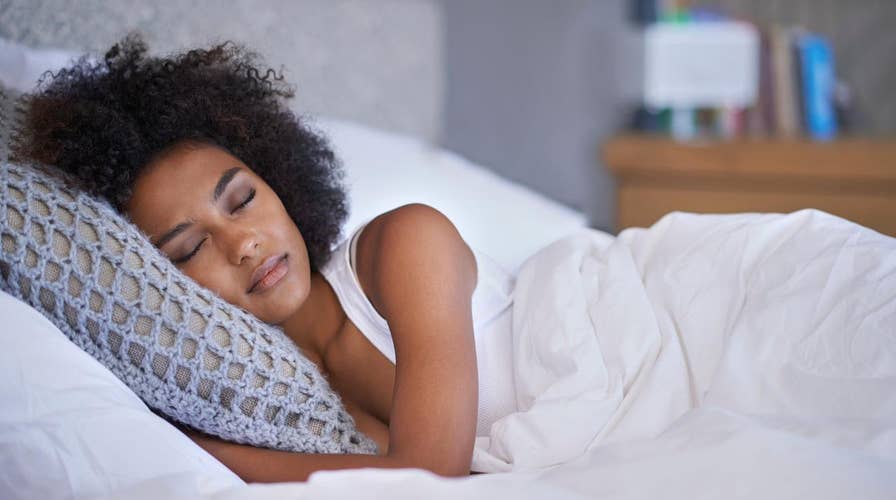Secret to the perfect night’s sleep
We’ve all experienced a night where we lie in bed and panic about how little sleep we’re getting. There’s good news though, it turns out last night’s sleep might be irrelevant. FOX’s Gerri Willis chats with Dr. Chris Winter, author of “The Sleep Solution: Why Your Sleep is Broken and How to Fix It”
In January 2016, Consumer Reports published a shocking article titled “Why Americans Can’t Sleep.” In it, we learn via a recent survey that 68 percent of Americans are struggling with their sleep once a week. That works out to be about 164 million people out there getting into bed on Sunday night and having problems falling asleep as quickly as they would like.
Big deal.
A 2015 survey of 10,000 people (Consumer Reports surveyed just over 4,000 people) found that 53 percent of Americans skipped breakfast entirely once a week. A 2011 NDP group survey found 31 million Americans never eat breakfast. With that knowledge, where are all of the “Why Americans Can’t Eat” articles?
THE MOST POPULAR SLEEP APPS LIKELY FALL SHORT IN AIDING USERS' REST
They are nowhere to be found because Americans can eat just fine. And most people sleep better than they think they do. These kinds of sleep headlines demonstrate just how poorly we understand sleep and how we have failed miserably when it comes to sleep education. Let’s go back to the Consumer Reports article, or really any article about our crisis of sleeplessness. Where do these numbers come from? Almost uniformly, these are survey responses, and this brings us to a big part of the problem: People are not good at reporting their own sleep. In fact, in many cases, they are terrible at it.
Why is this important? As a sleep specialist, I encounter patients who “don’t sleep” on virtually a daily basis. In their minds, they go to bed, sleep little to no time at night, and exit their beds in the morning to go about their day, often feeling miserable. It is physiologically impossible not to sleep for long periods of time, yet these individuals perceive the fact that they are accomplishing this feat with relative ease. If your definition of insomnia is “a condition where you can’t sleep,” there is absolutely no such thing as insomnia.
AGING ISN'T KILLING US, LACK OF SLEEP IS
Are there sleep-deprived people in America? There certainly are — and lots of them. They are the nurses that staff our emergency rooms, they are the proud people who work two jobs to earn enough money to pay their mortgage, they are factory workers, police officers and fast-food employees. Many of these people are getting inadequate sleep, or poor-quality sleep. It is an epidemic. Make no mistake, the vast majority of these Americans can sleep — they simply are not allowed time to log enough hours in bed because they are working! There is another group of people who have intrinsic problems with their sleep, like sleep apnea or narcolepsy, often unbeknownst to themselves and their physicians. None of these groups of people need new sheets, sleep-promoting apps, lavender spray or surprising sleep tips.
We live in an age of information sound bites, and the average time of that sound bite is shrinking. In 1992, a Harvard study concluded the average news sound bite was 7.3 seconds. I was told by a “sleep educator and social media influencer” that the age of the book is dead and that sleep information needed to be conveyed via clever Instagram videos no longer than a few seconds.
WHY WE HAVE TROUBLE SLEEPING IN HOTEL ROOMS
Unfortunately, for people to understand that Americans can sleep, and that insomnia and inadequate sleep are two different things, we need better education. Sleep struggles are real and the people who are going through them deserve more than scary numbers followed by the same 11 pieces of sleep advice we have seen in every checkout-line magazine in this country for the last 10 years. (We get it, no in the bedroom.) Let’s talk about how sleep really works, and how putting unrealistic expectations on ourselves and our kids is creating a problem that is easily solvable. I wrote The Sleep Solution, Why Your Sleep Is Broken and How To Fix It, so we all understand how our sleep works. This understanding can quickly lead to your sleep problems disappearing forever.
FOLLOW US ON FACEBOOK FOR MORE FOX LIFESTYLE NEWS
Dr. W. Chris Winter is a double board-certified and internationally recognized sleep medicine specialist, as well as a board certified neurologist with his own practice. He is a highly sought-after speaker and works directly with top athletes in the NBA, NFL, MLB, and NHL, including the Cleveland Indians, Pittsburgh Pirates, San Francisco Giants, Oklahoma City Thunder, New York Rangers, Washington Wizards, Baltimore Ravens, Tampa Bay Rays, and LA Dodgers. He is the Men’s Health “Sleep Specialist” and is frequently consulted by national media (Women's Health, Details, Bicycling, The New York Times, and The Wall Street Journal) as a sleep expert. He has treated over 10,000 patients’ sleep problems in his twenty-plus years of experience. For more info, go to http://www.thesleepsolutionbook.com.


